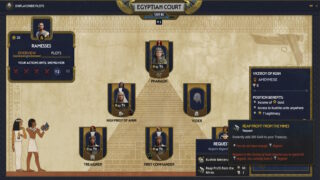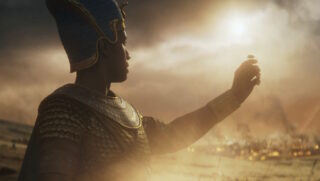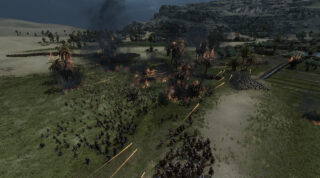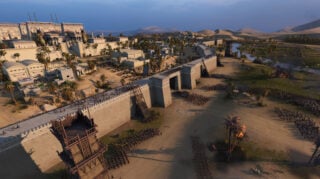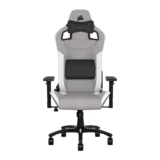Total War Pharoah is a familiar, but ambitious grand strategy game
Pharaoh leaves Total War’s foundations unchanged, but adds a handful of strong, welcome new features
- Game director
- Todor Nikolov
- Key Credits
- Hristo Enev (Battle designer)

There are only so many ways you can conquer the ancient world before it gets a bit predictable, but if you’re thinking Total War Pharaoh is just more of the same, Creative Assembly Sofia has a few surprises for you. Sure, it leaves most of the long-running strategy series’ key tenets unchanged. However, it builds on them in smart ways and makes the best use of any Total War game’s historical setting.
Assuming you get past the tutorials, that is. These are a confusing, overwhelming mess of information that sometimes repeats ideas, often have little to do with your current objective, and still manage to leave out key tips, such as how not to lose your cities to angry peasants.
What isn’t a mess is Creative Assembly’s approach to history. Take the Habiru, for example. They’re your basic units in Pharoah and a nomadic people that archaeologists argue over whether they were the biblical Hebrews or a loose coalition of Canaanite mercenaries.
Creative Assembly Sofia’s solution is to stick with the most basic facts – that the Habiru existed across Canaan and enjoyed watching empires fall, regardless of who happened to be in charge. It’s an elegant approach to history that adds a touch of fun to unit recruitment without sacrificing accuracy or getting lost in murky details.
CA Sofia did an admirable job of weaving historical fact into the game in other ways. Building graveyards to boost happiness, for example, seems like an odd touch, until you realize most commoners didn’t have access to proper graveyards. The Nile’s rise and fall determine your farm’s prosperity and how willing other factions are to trade, just as it was in actual ancient Egypt, and the annual Shemsu Hor celebration a vital part of your strategic calendar.
Underneath all that history, Pharaoh is still Total War, though. Your goal is picking a faction and leading it to victory through a mix of conquest, peaceful expansion, and careful negotiation across a massive part of the ancient world, although Pharaoh’s conception of victory is rather different from Troy’s.
You only get three factions this time – the Egyptians, the Canannites, and the Hittites – with two ultimate end states: becoming the Pharaoh or the King of the Hittites. While that may sound limiting, Total War Pharaoh gives you more ways to experiment on the path to the top.
One of those is the court, which offers a solid roleplaying element and lets you influence the people closest to the current Pharaoh. Your actions at court can augment your chosen victory path and Ancient Legacy – more on that in a bit – or make up for shortcomings in other areas.
You could buddy up to the Treasurer and spend all your court actions to curry Regard with them if you want economic superiority across the realm and then call in some favours to pad your coffers when the time is right. The Viceroy of Kush lets you recruit special military units, and if you play your cards right, you might even get enough support to spark a civil war and unseat the Pharaoh.
The downside is that it all starts to seem a little rote after a short time. Court intrigue boils down to a handful of basic actions, while developing regard just involves ticking boxes. You can blackmail someone if you have enough regard, and you can build regard by being nice each turn
“You only get three factions this time – the Egyptians, the Canannites, and the Hittites – with two ultimate end states: becoming the Pharaoh or the King of the Hittites.”
Aside from the shallow mechanics, it feels like a layer of reactivity is missing as well. If you learn about the Treasurer’s plot to assassinate the High Priest by gossiping with someone else, and that plot fails fails, surely you should be able to use that as leverage in your blackmail against the Treasurer.
Ancient Legacies are another strong new feature and ended up being one of my favourite parts of Total War Pharaoh. You choose a legacy near the start of your run, and it shapes how your efforts unfold with a dash of historical flair and a clever distribution of perks.
I picked the legacy of Akhenaten for my first one, which saw my Ramesses decide to revive Aten worship – Egyptian monotheism before Moses was said to have lived – at the expense of his other gods. This legacy makes you combine gods into a new form of Aten that grants you tailored benefits and pushes you gently toward aiming for a religious victory.

Even religious victory requires combat, and combat in Total War Pharoah is very much a Total War affair. If you’ve played any recent games in the series, you have a good idea what to expect already. Pharaoh gives you a strong mix of unit types to strategize with, including ranged and melee chariot units, heavily armored fighters, archers, and generals.
Most of your skirmishes require a decent level of strategy and smart unit formation, and the big invasions take even better planning – in theory. The usual Total War problem persists in Pharaoh. On normal and lower difficulties, you can cheese most battles by throwing all of your soldiers at the enemy and peppering them with a few squads of ranged attackers.
Later fights and those outside your main area of control in central Egypt benefit significantly from better map design that takes advantage of unit placement and sightlines, but getting to that point feels like more of a slog than it should.
“Total War Pharoah doesn’t reinvent the wheel, but it does introduce a handful of promising and sometimes deep new ways to approach the familiar formula.”
Creative Assembly Sofia also added some extra features, including weather and terrain, to keep things fresh. You might fight in overwhelming heat and lose energy more quickly or get stuck in a sandstorm with low visibility and reduced movement cost. Walking through water leaves your units vulnerable, and you can take advantage of dry conditions by setting fires to devastate enemy settlements.
When combat works, it works brilliantly. I did encounter more than a few problems with the AI, though, where my soldiers would stand and watch their comrades come under fire without doing anything. The problem isn’t unique to Pharoah – I experienced it in Warhammer 3 as well – but it did happen often enough that I found it difficult to overlook.
Total War Troy and Warhammer 3 are about establishing your empire, and that’s pretty much where it ends. In Pharaoh, your enemies can unseat you just as easily as you dethroned the last ruler, or your mismanagement might plunge the kingdom into ruin, invite invasion, and even leave it vulnerable to natural disasters.
Total War Pharoah doesn’t reinvent the wheel, but it does introduce a handful of promising and sometimes deep new ways to approach the familiar formula. Combat is still hit-and-miss, but the approach to history and empire-building are among the best in the Total War series.
Total War Pharoah doesn’t reinvent the wheel, but it does introduce a handful of promising and sometimes deep new ways to approach the familiar formula. Combat is still hit-and-miss, but the approach to history and empire-building are among the best in the Total War series.
- Brilliant use of history to undergird everything from descriptions to important mechanics
- Some refreshing and clever new features
- Extensive customization to help you tailor each campaign
- Grand strategy elements like the court feel underdeveloped
- Combat is still a slog, and the AI can be dodgy
- Tutorials are a bit of a mess
